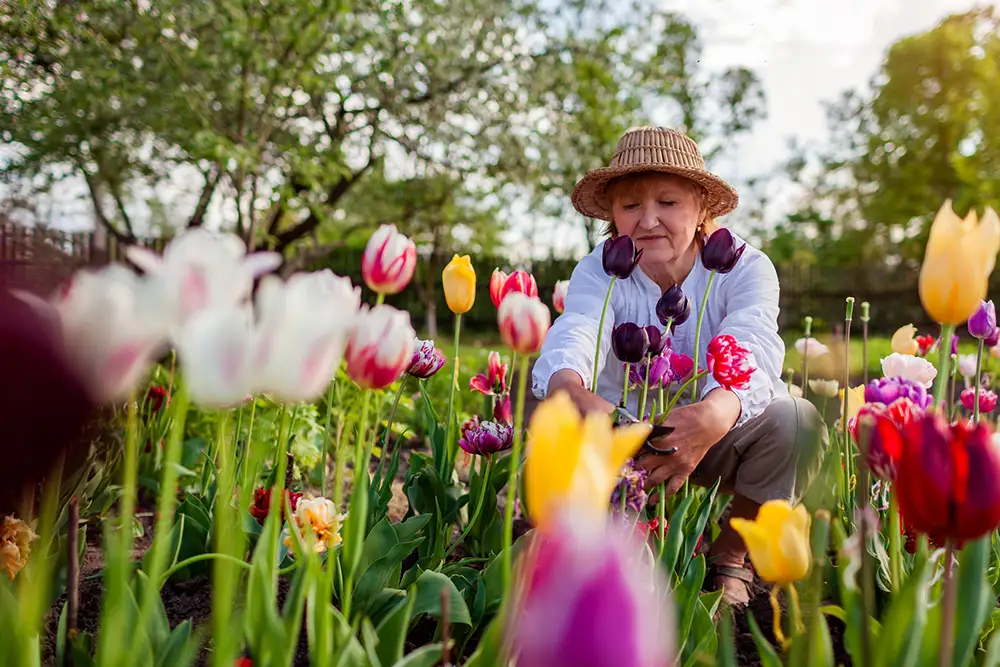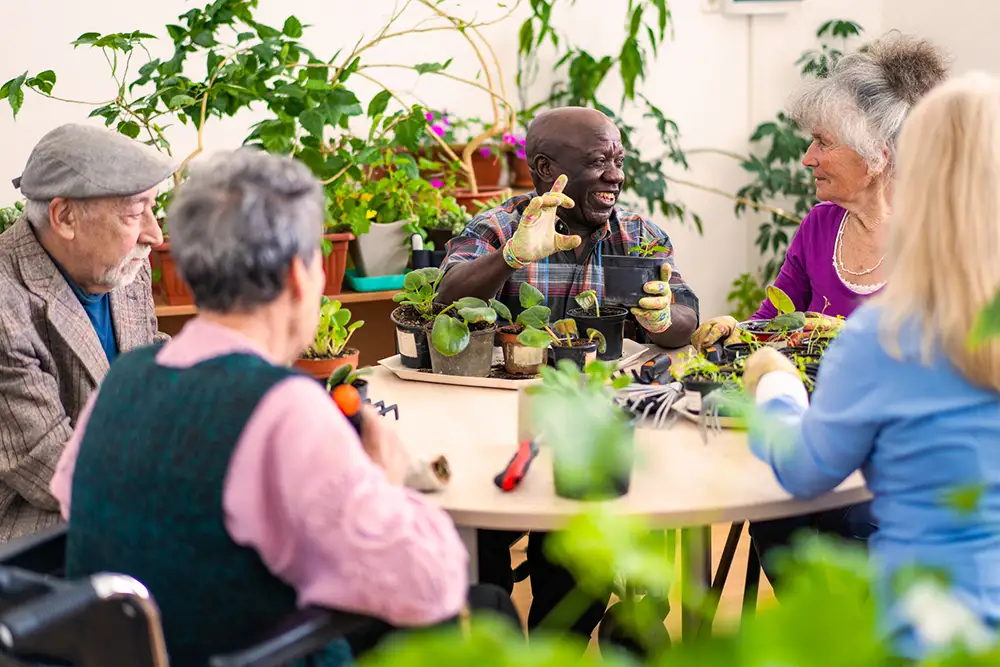Gardening is more than a relaxing hobby – it’s a gateway to better health (Mayo Clinic), happiness and community connection. For seniors, the benefits of gardening extend beyond the satisfaction of growing beautiful flowers or fresh vegetables.
Gardening activities provide a unique blend of physical exercise, mental stimulation and emotional well-being, making it an ideal pastime for older adults. Whether you’re looking to stay active, relieve stress or connect with others, gardening can be a rewarding and enriching experience. Let’s explore the many benefits of gardening for older people and how you can get started.
Physical Benefits of Gardening for Older Adults
Exercise & Strength Building
Gardening is a fantastic light exercise that promotes flexibility, strength and endurance. Digging, planting, weeding and watering all contribute to increased mobility and coordination. This kind of activity helps maintain muscle tone and can even aid in preventing osteoporosis by improving bone density through weight-bearing movements. Engaging in regular gardening can enhance overall strength, making daily activities easier and helping seniors maintain their independence.
Sun Exposure for Vitamin D
Spending time outdoors while gardening exposes seniors to sunlight, which is essential for vitamin D production. Vitamin D plays a crucial role in bone health, reducing the risk of osteoporosis and fractures. However, it’s important to practice safe sun exposure by wearing a hat, applying sunscreen and gardening during cooler hours to avoid excessive heat.
Lower Blood Pressure
Physical activity that doubles as a relaxing experience can lower blood pressure (National Library of Medicine) as well, contributing to improved physical and mental health.
Mental & Emotional Benefits for Seniors
Stress Relief & Mental Health
Gardening has been shown to significantly reduce stress levels and promote relaxation. The rhythmic nature of planting and tending to a garden fosters a sense of peace, while the accomplishment of watching plants grow instills a deep sense of satisfaction. Being outdoors and surrounded by nature can improve mood, lower anxiety and create a sense of purpose, making gardening an excellent way for seniors to nurture their emotional well-being.
Cognitive Benefits
Gardening engages the mind, keeping it active and sharp. Studies suggest that gardening can help reduce symptoms of dementia by stimulating cognitive functions such as memory, problem-solving and sensory awareness. Additionally, participating in gardening clubs and community gardens fosters social engagement, further enhancing mental well-being.
Connection to Nature
For many seniors, connecting with nature brings a sense of peace and grounding. The fresh air, the smell of flowers and the hands-on experience of working with soil create a calming environment that nurtures mental clarity and emotional balance. Gardening allows older adults to engage with the outdoors in a meaningful and therapeutic way.
Practical Tips: How To Get Started Gardening
Choosing the Right Garden
Getting started with gardening doesn’t require a large yard or extensive knowledge. Seniors can begin with small container gardens, raised garden beds or even indoor herb gardens. These options provide accessibility and ease of maintenance while still delivering the joys of gardening. Choosing easy-to-care-for plants, such as tomatoes, lettuce and herbs, ensures a successful and enjoyable gardening experience.
Safety While Gardening
While gardening is beneficial, it’s essential to take precautions to avoid overexertion and dehydration. Seniors should:
- Take regular breaks and avoid gardening during peak sun hours
- Stay hydrated by drinking plenty of water
- Wear protective gear like gloves, a wide-brimmed hat and sunscreen
- Use ergonomic tools designed to reduce strain on joints and muscles
- By following these safety measures, gardening remains a safe and enjoyable activity.
Gardening as a Source of Fresh Food
Growing Your Own Food
One of the most rewarding aspects of gardening is harvesting homegrown fruits and vegetables. Growing fresh produce not only provides a nutritious food source but also instills a deep sense of accomplishment. Seniors can enjoy the satisfaction of preparing meals with ingredients they’ve cultivated themselves.
Improving Diet and Health
Eating freshly grown vegetables and herbs enhances a senior’s diet, providing essential vitamins and minerals that support overall well-being. A diet rich in homegrown produce contributes to better digestion, increased energy levels and a stronger immune system, making gardening a natural way to promote long-term health.
Social Opportunities Through Gardening
Gardening Groups & Community Events
Gardening is not just a solitary activity – it’s a wonderful way to build friendships and connect with others. Many senior living communities, including Charter Senior Living, offer gardening clubs and group activities that bring people together over a shared love for plants. These social interactions help combat loneliness and create a sense of belonging.
Explore the Possibilities in Bloom at Charter Senior Living
Gardening is a powerful tool for enhancing the physical, mental and emotional well-being of seniors. Whether you’re looking for a relaxing hobby, a way to stay active or an opportunity to engage with your community, gardening offers something for everyone. At Charter Senior Living, we encourage residents to explore the possibilities in bloom through various gardening initiatives designed to enrich their lives.
Ready To Explore How Gardening Can Enhance Your Lifestyle?
At Charter Senior Living, we support active, fulfilling lifestyles through wellness programs that include gardening opportunities. Learn more about how we can help you bloom into a healthier, more vibrant lifestyle. Contact us today to discover all the possibilities at Charter Senior Living.


